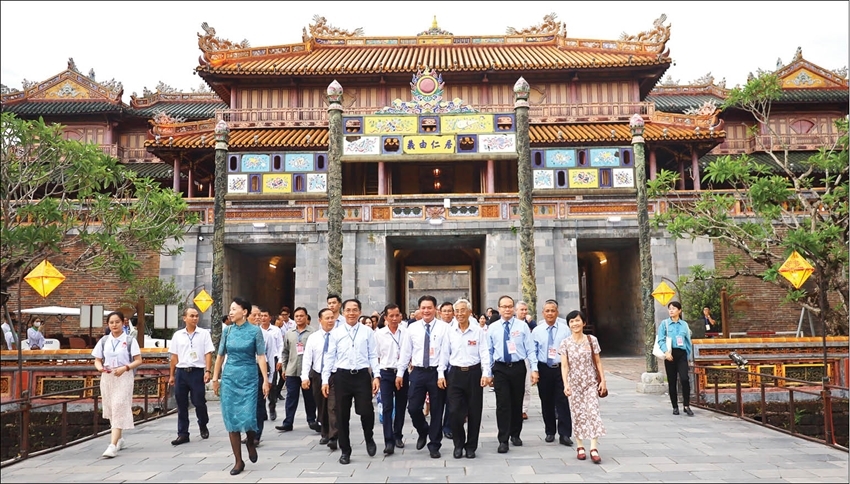 |
| Dr. Phan Thanh Hai |
Regarding the impending effective date of the (amended) Cultural Heritage Law, Hue Today Weekly had an interview with Dr. Phan Thanh Hai, a member of the National Cultural Heritage Council, and Director of the Department of Culture and Sports of Hue City.
Sir, what is your assessment of this (amended) Cultural Heritage Law?
The Cultural Heritage Law No. 45/2025/QH15 comprises 9 chapters and 95 articles, an increase of 2 chapters and 22 articles compared to the current law (7 chapters, 73 articles). It inherits the positive aspects of the 2001 Cultural Heritage Law, which was amended and supplemented in 2009. At the same time, it includes provisions on many new issues that are clear, proven in practice, and highly stable. It has also amended overlapping, inappropriate, and impractical regulations to create a basis and direction for resolving numerous institutional bottlenecks, aligning with the current legal system. These include issues related to the inadequacies concerning the zoning for monument protection; the repair, renovation, and construction of individual buildings and houses inside and outside monument protection areas; and the implementation of projects for the preservation, embellishment, and restoration of monuments, intangible cultural heritage, and documentary heritage, etc.
 |
| Once effective, the (amended) Cultural Heritage Law will enhance the effectiveness and efficiency of state management in the conservation and promotion of national cultural heritage values in general and in Hue City in particular |
The rights, responsibilities, and obligations of individuals, organizations, agencies, and units; as well as the promotion of socialization, public-private partnerships, and the establishment of various types of funds for the conservation of national cultural heritage have been more specifically and clearly defined. The regulations in this Law aim to build a national database, digital transformation of cultural heritage, and have been researched for alignment with various international treaties to which Vietnam is a member in the process of managing, protecting, and promoting cultural heritage values.
How will this law, once effective, directly impact Hue - a land that is preserving many important cultural heritage values of the country?
Hue's heritage is a convergence of the nation's wisdom, culminating in 8 UNESCO-recognized heritage sites. It boasts 3 complexes (systems) of special national monuments, 89 national level monuments, and 106 city-level monuments; 278 structures and sites on the approved and announced inventory of monuments; 6 national intangible cultural heritages; 14 artifacts or groups of artifacts (comprising 40 artifacts) designated as national treasures, along with a treasury of particularly rare documents, antiques, intangible cultural heritage, and other documentary heritage.
The conservation and promotion of the values of this cultural heritage system, linked with socio-economic development, have received close attention and guidance from all levels of the city government, leading to many achievements and results that have been recognized and highly evaluated by agencies, ministries, and sectors. However, during the implementation of these tasks, there are also some difficulties and inadequacies as mentioned above.
The Cultural Heritage Law No. 45/2025/QH15, officially effective on July 1, will resolve many bottlenecks that have existed previously. Administrative procedures will be simplified, and the processing time for administrative procedures will be shortened. There will be more mechanisms to mobilize social resources; and promote decentralization and delegation of power, with specific responsibilities for agencies and localities specifically. It will also meet the demands of the digital age, and international cooperation, etc. This will certainly contribute positively to enhancing the effectiveness and efficiency of state management in the conservation and promotion of national cultural heritage values in general and in Hue City in particular during the era of the nation's rise.
What steps will the cultural sector take to ensure that the Cultural Heritage Law promotes local development while also preserving cultural heritage values?
In late 2024 and the first quarter of 2025, the Department of Culture and Sports of Hue City actively contributed opinions to numerous draft guidelines for the implementation of the Cultural Heritage Law No. 45/2025/QH15. The Department has instructed its specialized divisions and units to continue researching and reviewing these drafts to ensure that their contents both comply with current regulations, and are suitable for practical implementation.
In the immediate future, the Department of Culture and Sports will inform and disseminate the regulations of the Cultural Heritage Law No. 45/2025/QH15 to cultural, scientific, and information divisions at the district level, as well as officials and civil servants responsible for cultural affairs at the commune level. The Department will develop a comprehensive plan for propaganda, dissemination, and legal education on cultural heritage for all agencies, units, organizations, and individuals involved in the conservation and promotion of cultural heritage values in Hue City; this plan will ensure the synchronicity and consistency in implementation. Simultaneously, the Department will advise the People's Committee of Hue City to issue detailed guiding documents on one or more issues stipulated in the Law or Central Government documents, if deemed necessary and urgent for the practice in Hue.
And what about the long-term, sir?
The Department of Culture and Sports will continue to focus on organizing training to ensure adequate resources and personnel for law enforcement within the state administrative system, including cultural heritage law. This is to maintain stability, smooth operations, and effectiveness in serving the purpose of conserving and promoting Hue's cultural heritage in conjunction with sustainable socio-economic development.
Additionally, the Department will strengthen guidance on effectively implementing inspection, examination, and violation handling in cultural heritage law enforcement. This will allow for timely proposals, recommendations, and remedial measures regarding inadequacies, limitations in legal provisions, or overlaps between legal provisions and practical implementation, so as to propose competent authorities to amend, supplement, or provide appropriate guidance.
Thank you, sir!